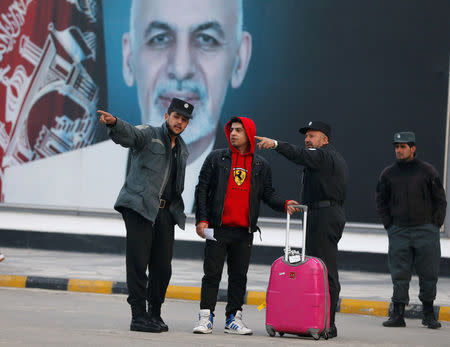Dozens of Afghans deported from Germany as Merkel takes firmer line

By Mohammad Aziz and Madeline Chambers KABUL/BERLIN (Reuters) - A group of 34 rejected Afghan asylum-seekers arrived in Kabul from Germany on Thursday, the German interior ministry said, the first to be deported under an agreement reached between the two countries this year. Their expulsion is in line with a tougher approach from the government of Chancellor Angela Merkel, who has faced domestic criticism for letting in more than a million migrants since the start of 2015. As she prepares to run for a fourth term next year, she is throwing out those who do not qualify as refugees. "It was early morning and I was sleeping when four policemen came to my home and arrested me," said Ali Madad Nasiri, one of the men on board a charter plane that landed in the Afghan capital from Frankfurt. "I didn't have a chance to take my clothes, cellphone and laptop - all left behind," added Nasiri, who said he had been living in Germany for three years. Afghans made up a fifth of all migrants entering Europe last year, the second biggest share after Syrians. The deportations are taking place under an agreement reached between Germany and Afghanistan in October. Making clear that more would follow, Interior Minister Thomas de Maiziere said in Berlin that granting asylum to those who need it and ensuring that others leave are two sides of the same coin. Only people who can prove they are refugees fleeing persecution, war or violence are eligible for asylum. "These deportations are right and necessary to keep the asylum system functional," said de Maiziere. He added that one-third of those deported were criminals convicted of offences, from robbery and drugs crimes to rape and homicide. Of the 50 men due on the plane, 16 had disappeared. "WHAT SHOULD I DO?" In response to criticism that returnees may face reprisals in Afghanistan, de Maiziere said that while the security situation was "complicated", there were large parts of the country that were safe. More than 3,200 Afghans had voluntarily left Germany this year, he added. The Afghan Ministry of Refugees will help returnees get back to their homes, a ministry spokesman said, adding that about 10,000 Afghans had returned from Europe this year. The mass influx of migrants and refugees to Germany has raised concerns about security and integration. The arrest this month of an Afghan refugee suspected of raping and murdering a student in the southern city of Freiburg has caused outrage. Anti-immigrant groups such as the Alternative for Germany (AfD) party have surged in popularity, while support for Merkel has waned. Afghanistan's Western-backed government is battling militants who have stepped up attacks since the withdrawal of most foreign troops in 2014. Western military officials estimate the Taliban control or contest nearly a third of the country. Civilian casualties are near record high levels, with thousands killed and wounded every year. The government is also struggling to develop the economy. "Everyone loves his country. I also love my country but what should I do here?," said Mati Ullah, 22, who said he had no job prospects in Afghanistan. "Do I have to go and join the Taliban or Daesh?" he asked, referring to Islamic State militants. (Writing by Randy Fabi, Michael Nienaber and Madeline Chambers; Editing by Robert Birsel and Mark Trevelyan)

